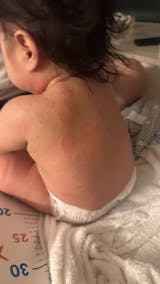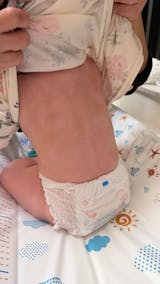What Is Sweat & Heat Allergy? Treatments & Symptoms Guide

Table of content
Why does your skin itch after exercise?
Understanding sweat allergy
Many people get red, itchy skin after working out. This could be a reaction to sweat allergy or heat sensitivity. When we exercise intensely, our body heats up and sweats a lot. The salt and other substances in sweat can irritate the skin and trigger an allergic reaction.
This condition is called cholinergic urticaria in medical terms - a special type of heat-related rash.
Common Symptoms of Sweat Allergy
Red Spots on Skin: Small red dots or bumps appear after exercise
Intense Itching: Especially in sweaty areas like the neck, chest, and back
Burning Sensation: Noticeable heat or discomfort on the skin
Hives or Raised Rashes: In severe cases, large swollen patches may develop
Duration: Symptoms usually go away on their own within 30 minutes to a few hours
“I have been using baby eczema combo and both my face and body stop itchiness, redness soon after. I’m very happy with the results and hoping can completely get rid of my eczema soon. 🥹🥹🥹” (translated)
Typical Skin Symptoms of Sweat Allergy
The most noticeable sign of sweat allergy is a cluster of tiny red spots, about 1–3 mm in size, often surrounded by redness. These rashes usually appear on the upper body, especially the chest, back, and neck, but can also spread to the arms and legs.
The affected areas feel very itchy, like “a thousand ants crawling,” and often have a burning sensation. The skin may feel warm to the touch.
Many people describe the reaction starting with flushed skin, quickly followed by raised red bumps. Sometimes, these bumps join together to form larger, irregular red patches.
These symptoms often come on quickly - usually 15 to 20 minutes after sweating, and fade away within 30 minutes to 2 hours once sweating stops.
Whole-Body Reactions and Other Symptoms
Besides skin symptoms, some people may also experience full-body reactions. Common signs include dizziness and mild headaches, which may be related to the body having trouble regulating temperature.
Some may feel nauseous or lose their appetite for a short time. In more serious cases, symptoms like a fast heartbeat or difficulty breathing may appear. These are signs that the allergy is affecting the whole body and need immediate medical attention.
A few people may also have “reflex symptoms,” meaning allergic reactions show up in areas not directly exposed to sweat. For example, the palms or soles might feel tingly, or the mouth might feel slightly swollen. These symptoms usually suggest a more severe allergy.
Severity Levels of Sweat Allergy Symptoms
Based on clinical signs, sweat allergy can be divided into three levels:
-
Mild: Localised itching and small red spots; daily activities are not affected.
-
Moderate: Widespread skin reaction with clear discomfort, but no symptoms in other parts of the body.
-
Severe: In addition to skin symptoms, there are systemic reactions such as difficulty breathing or changes in blood pressure.
Difference Between Sweat Allergy and Eczema Flare-Ups After Exercise
Many people with eczema find their symptoms get worse after exercise, but this is different from a simple sweat allergy:
|
Feature |
Sweat Allergy |
Eczema Flare-Up |
|
Onset Time |
During or right after exercise |
May be delayed by several hours |
|
Rash Appearance |
Small red spots or hives |
Dry, flaky, or thickened skin |
|
Duration |
Temporary (a few hours) |
May last several days |
|
Itching Severity |
Intense but short-lived |
Moderate to severe, persistent |
Sweat Allergy Product Recommendations
No No Itchy Gel
This natural gel helps soothe itchiness, and ingredients such as aloe vera, tea tree oil, calendula and chamomile oil moisturise skin and promote healing.
Benefits
- All natural organic fast acting soothing formula
- Design to calm eczema itchiness and redness
- Suitable for soothing mosquito bites
- Effective in relieve light scald area
Organic Baby Lotion
Organic Baby Lotion is a rich and nourishing humectant for chapped and dried skin on the hands, face and body. The combination of organic cocoa butter, shea butter, aloe vera, oatmeal colloidal, calendula and chamomile oils work to soothe dry and itchy skin as well as to help skin replenish and nourish.
Benefits
- Clinically proven to effectively relief eczema
- Keep moisture in skin by reducing water loss
- Heal rashes and redness
- Help protect your skin from external aggressors
Organic Baby Toner
All natural and organic ingredients, no added chemical preservatives and no artificial flavours or colours, this baby toner infused with concentrated aloe vera, calendula, and chamomile flower extracts. Apply thin layer to calm the skin, and regular use can prevent heat rash. If eczema or diaper rash condition persists, spray thin layer before applying Ms. Chu Baby Lotion to accelerate the absorption and recovery.
Benefits
- Lock in moisture and prevent dryness feeling skin soft, smooth, and supple
- Especially designed for heat rash
- Suitable for summer time outdoor application to ease eczema and sensitive skin
- Help lotion absorption when applied prior
All Purpose Body Lotion
All Purpose Body Lotion is an organic rich and nourishing humectant for chapped and dried skin on the hands, face and body. The combination of organic cocoa butter, shea butter, aloe vera, oatmeal colloidal, calendula and chamomile oils work to soothe dry and itchy skin as well as to help skin replenish and nourish.
Benefits
- Effectively relieves severe cases of eczema
- Ultra silky smooth texture helps keep moisture in skin
- Heals rashes and reduces skin redness
- Builds barrier to protect your skin from external aggressors
Baby Mineral Sunscreen SPF50+
Leveraging a gentle, hypoallergenic concoction, our Baby Sunscreen SPF50+ defends the sensitive skin of newborns from the damaging effects of the sun while they enjoy outdoor activities.
No No Tan Sunscreen SPF50+
Protect your skin from the sun's harmful rays with Ms. Chu No No Tan Sunscreen. This organic natural, broad spectrum, water resistant SPF 50 sunscreen lotion absorbs well into your face and body without feeling drying or irritating.

"Don't forget your sunscreen! Even on cloudy days, UV rays can be intense."
3 Practical Solutions to Relieve Post-Workout Skin Discomfort
Besides using skincare products, the best way to prevent skin problems after exercise is to build a full protection routine—before, during, and after your workout. Pair this with the right skincare and long-term care to truly solve the issue.
1. Before Exercise: Prepare Your Skin
Prevention is better than cure. Getting your skin ready before a workout can help stop irritation before it starts.
-
Clothing matters: Wear breathable fabrics like polyester or other sports materials. These help wick away sweat and reduce friction.
-
Protect sweaty areas: For spots that sweat easily—like your underarms, neck, or groin—apply a thin layer of Vaseline or anti-chafing balm before working out. This creates a barrier to protect your skin.
-
Don’t forget sunscreen: Use a physical (mineral) sunscreen to protect your skin from sunburn, especially if you're exercising outdoors.
2. During Exercise: Handle Skin Reactions Quickly
As your body heats up and sweats during exercise, it’s important to take care of your skin at the moment. If your skin starts to feel hot or itchy, take these steps right away:
-
Lower the intensity of your workout
-
Move to a cool, shaded, or well-ventilated area to rest
-
Gently pat your pulse points (like wrists or neck) with cold water to cool down
-
Spray your skin with a hydrating mist
-
Stop your workout early if needed to avoid more irritation
3. Post-Workout Skincare Routine
The first 30 minutes after exercise is the best time to care for your skin.
Shower with lukewarm water (around 32–35°C), and avoid hot water as it can irritate your skin further. Use a gentle body wash with a pH around 5.5. Avoid products with alcohol or strong fragrances.
Key skincare steps:
1. Rinse off sweat as soon as possible
2. Use mild, non-irritating cleansers
3. Apply moisturiser right away while your skin is still slightly damp

Ms. Chu’s Advice: Balancing Exercise and Skin Health
Ms. Chu, founder of Ms. Chu Soap & Beauty, encourages people with sweat allergies or eczema not to avoid exercise completely. Instead, she recommends:
-
Exercising during cooler times of the day
-
Trying water-based activities like swimming to reduce sweat buildup
-
Building up your workout routine gradually so your skin can slowly adjust
-
Keeping your workout environment clean to avoid contact with other allergens
With the right prevention and skincare steps, most people can manage post-exercise skin discomfort effectively - and still enjoy the benefits of staying active without skin problems.






















Leave a comment